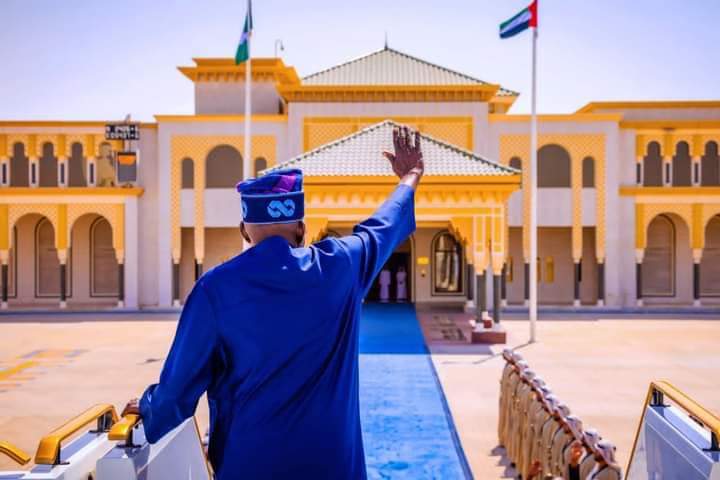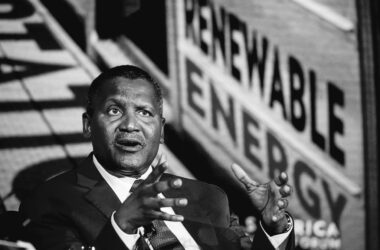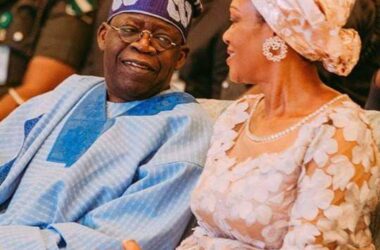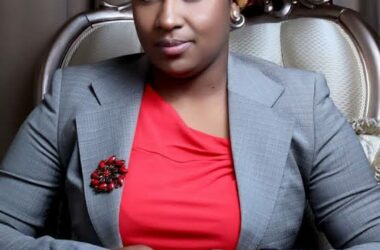It was billed as a ‘private’ visit. However, the swirl of speculations – and, one might say, controversy – that has trailed President Bola Ahmed Tinubu’s most recent visit to France (from late January to the first week of February 2024) have been anything but private.
But the controversy surrounding the Nigerian leader’s trip to Paris, one suspects, is about more than just the trip itself, but more about its socio-economic context. Over the years, afterall, successive leaders of Africa’s most populous country have ranked among the world’s most traveled public figures. Like migratory birds, past Nigerian leaders – military and civilian alike – have undertaken trips to all manner of countries around the globe with bewildering frequency, and for all manner of reasons – for business, pleasure or (in recent times and with increasing numbers) for medical reasons. To be fair, President Tinubu has never hidden his intention to re-engage with the rest of the world, especially with Nigeria’s developmental partners, in a far more robust, hands-on manner to reverse the impact of the subtle (and sometimes not-so-subtle) cold shoulder the country had received from the international community during successive regimes – and especially that of his predecessor, Pres. Muhammadu Buhari.
So, what’s so special about President Tinubu’s France visit?
While some say these frequent visits help to bolster the visibility of our nation (as embodied in the person of our leader) on the world stage, others say such frequency – especially to the same country in a relatively short period of time – amounts to a certain level of over-exposure that is less than dignified, at best, in the leader of a sovereign world leader – and at worst exposes his nation to ridicule.
And then there are those for whom the France trip by the President, and the seeming cloud of secrecy in which it was shrouded, brings on a sense of deja vu: For 8 years, the aforementioned Pres. Buhari, along with his family, their hangers-on and political bootlickers went on trips whose reasons were unknown to the generality of Nigerians, at the expense of Nigerian taxpayers. In a thinly-disguised show of contempt for the sensibilities of Nigerians, the former President, in particular, stayed abroad (ostensibly for health reasons) for unusually lengthy periods of time, without even the courtesy of letting Nigerians in on what ailed him, how long he was going to stay away for, and what such stays were costing the Nigerian treasury. In the course of his two terms of office, the record shows that Buhari spent about 225 days attending to his undisclosed health challenges, mostly in London, UK. To add insult to injury, his media handlers, instead of giving cogent explanations for the ex-President’s extended stays, resorted to titillating Nigerians with pictures of a lounging Buhari welcoming a flurry of loyalists, party chieftains and so-called well-wishers, whose sole reason for visiting, it seemed, was simply to pose for photo-ops. In time, the former President’s ‘medical vacations’ became a sort of political circus – as the country’s leading politicians trooped to London to ‘wish him well’ and to hold political meetings on how to ‘move the country forward. ‘ Since then, that circus has now become an integral and permanent, tradition in our democratic road-show.
Against that background, citizens of Nigeria who invested their hopes in Asiwsju Tinubu’s ascension to the Nigerian presidency were certain he would be smarter, more nuanced and generally different from his predecessor in handling matters like this. He would travel less, they believed – and only to those countries whose interests aligned with ours, and who are able to make a difference in our developmental quest. And whenever he left the shores of Nigeria, he would give his countrymen and women the low-down of his visits (in terms of rationale, duration, and expected benefits to the nation’s economic life). Thanks to his education, exposure and experience in public life, many Nigerians believed, he would act according to global best practices when it came to issues of transparency and running an open government.
That, at least, was the assurance the government itself gave at the inception of its tenure. In the words of the Minister of Information and National Orientation, Mohammed Idris, the Federal Government would level with Nigerians on all issues of national concern – devoid of propaganda. “The focus of government now,” he had said at the time, ” … is to restore the confidence of the governed in government and its institutions…Transparency is the currency that builds credibility, (and) authenticity is the foundation upon which lasting relationships are built.”
Another reason for the angst being expressed in many quarters about the President’s ‘private’ visit to the European nation, it seems, is the presence of a number of government dignitaries in his entourage, and the role they seemed to be playing during his stay there. What, for example, was the National Security Adviser, Mallam Nuhu Ribadu, doing on his principal’s private trip? What concurrent business was he conducting in France at that time?
To be sure, no right thinking Nigerian can begrudge the leader of a complex national entity beset with so many challenges (all begging for attention at the same time) a few days off after eight grueling months of combatting the fallout of a naira in free-fall and galloping inflation, etc. Neither should he be denied the opportunity of an escape, however momentary, from the groanings of a populace victimized by deepening poverty and terrorized both physically and psychological by spiralling insecurity. But the manner in which such a getaway is handled by the President’s aides should call for concern; it should be clearly communicated to Nigerians with some level of circumspection. As one commentator put it: “Let the President’s media managers be smart enough to know that when you announce … a private visit, you need to let it remain simple. Deliberately circulating pictures of the President at lounges, bars and gyms to propagate a metaphor of fitness is deceitful. If you did not involve citizens in the details of the visit ab initio, you do not communicate seriousness with those graphics.”
It is time for our leaders – and especially their media handlers – to begin to treat their fellow-citizens as though they and their opinions matter, for better or for worse. That attitude – of listening to the populace rather than just lecturing them on all the worderful things government is doing on their behalf – is one of the tenets of democratic governance. That is one of the reasons why, in the so-called advanced democracies, many leaders (including those who claim that they are ‘not influenced’, by opinion polls, have their own private pollsters who help them feel the pulse of the public over whose affairs they preside, or whom they represent in legislative institutions). It is not enough to simply tell people who question the doings of government, or who seek to know the whereabouts of our leaders per time, or seek explanations as to the rationale for such doings, to shut up, or to call them names. It is contrary to the spirit of democracy, accountability and transparency.
A recent example of how seriously, public officials take the perception of the populace concerning their actions in those climes is the recent episode involving the US Secretary (ie Minister) of Defence, Gen. Lloyd Austin, who disappeared from public view, without notice, upon his hospitalization for prostate cancer surgery. His disappearance was perceived as a PR blow for his principal, President Joe Biden in an election year. Austin was forced to apologise to the American people for failing to fully report his whereabouts and to give full disclosure as to the reasons for it. And that is just a Minister – albeit one at the head of a sensitive department of the US government at a period of increasing geo-political tensions. Imagine if he had done that as President or Prime Minister of the country!
Speaking of medical concerns – or rumours thereof – it is often said that Nature (and especially human nature) abhors a vacuum. In a situation where official and credible information on any issue of public concern is hard to come by, the grapevine and the rumour mill will definitely take on the character of an industry. We saw it during Buhari’s tenure; at one time during his long, unexplained absences, it was rumoured that the former President had succumbed to his illness; that he was secretly buried in S/Arabia; and that it was his ‘clone’ that was presiding over the affairs of Nigeria on behalf of a sinister cabal unwilling to relinquish power and the privileges that come with it. Not a small number of Nigerians suspended their disbelief and gave those outlandish rumours an unhealthy amount credibility – even the skeptical among them adopted the attitude of ‘Theres no smoke without fire.‘
That pattern of presidential rumour-mongering is beginning to rear its head again, aided and abetted by the lack of full disclosure on the part of the President’s media and PR handlers. Just the other day, the leading opposition party in the country, the People’s Democratic Party (PDP) issued a statement accusing the Presidency of harbouring a hidden agenda designed to conceal the ‘fact’ that the President was seriously ill – and that the France trip was in response to a medical emergency. “We are back to another Muhammadu Buhari,” the PDP’s spokesman reportedly said. “… President Tinubu has a health challenge and they are trying to cover up his health issues … So as far as we are concerned, this is completely … unacceptable. Nigerians deserve to know details about his travels …considering the level of insecurity in the country at the moment.”
Spokespersons for both the President and the ruling All Progressives Congress (APC) have duly denied the PDP’s allegations, but in view of past experience, you can be sure that many Nigerians will take these denials with the proverbial pinch of salt. And who can blame them?
.
Much concern has also been voiced over the President’s choice of France as his preferred destination for this particular visit in view of recent events. Some observers believe it is rather impolitic for the Nigerian leader, in his capacity as the current Chairman of ECOWAS (the Economic Community of West African States) to pay ANY kind of visit (private or otherwise) to a country whose role in the sub-region is widely seen as the reason for the negative chain of events that have added to the instability in the region – namely the military coups in Burkina Faso, Mali and Niger Republic and the new junta leaders’ hostility to France in view of their long list of grievances against France’s continued neo-colonialist activities in their respective countries; ECOWAS’ threat of a military response to restore constitutional rule (backed up with economic and political sanctions, plus the suspension of the three countries from the body); and now, the countries’ outright withdrawals from ECOWAS. Observers are worried that with this ‘private’ visit to France at this time, the Nigerian President might be seen to be in league with the former colonial master AGAINST its three West African former colonies. Simply put, the ECOWAS Chairman SHOULDN’T BE GOING TO FRANCE (OF ALL COUNTRIES) AT THIS TIME. As much ECOWAS strongly dissaproves of a forceful takeover of power in its domain, its leader cannot be seen to be giving ammunition (even if it is just in the form of a courtesy visit) to a country at whom so much Francophone anger is directed.
Beyond just issuing denials and clarifications as to the true nature of President Tinubu’s trip to France (or future trips of this sort) it is the view of many observers that his media handlers – and indeed the entire machinery of government’s engagement with the citizenry – ought to be proactive rather than reactive. Rather than wait for misinformation to rear its ugly head before scrambling to squelch it with denials and clarifications, relevant government bodies ought to inform the people in a timely fashion through the proper channels in such a way as to get their buy-in (in cases of policies and programmes and projections) or their confidence, as a bulwark against false, surversive or treasonable information designed to cause disaffection among the people.
Indeed, it is my considered opinion that perhaps the time has come for the Tinubu Administration to do something novel – such as consucting Town Hall Meetings in various locations across the nation designed to feel the pulse of the people. It is hard for most Nigerians not to see the Aso Rock Villa (the seat of presidential power in Nigeria) as an impenetrable fortress to which none but the most privileged and most highly connected can gain access. Over the years, Aso Rock has become a rock of isolation – in a way that even the White House in Washington, DC, USA, 10 Downing Street in London, UK and the Elysees Palace in Paris, France are not – no thanks to the deliberate isolation of those who govern from the governed.
To counter the widespread perception among the generality of Nigerians that their leaders are too detached from their lives to truly understand the issues that confront them, perhaps the President should consider taking the periodic meetings of the Federal Executive Council (FEC) to each geopolitical region of the country in turn. The mere presence of the President and his team of top officials in each of these regions will represent a powerful symbolism that can engender deep feelings of belonging among the people of each region, and in turn catalyse attitudes (and actions) that promote unity and cohesion among Nigerians and push back against divisive tendencies. Also, such an engagement can give the President a first-hand experience of the true situation of things in each part of the country (something no self-serving aide can give him).
The idea that elected leaders do not owe their fellow citizens an explanation for their actions or inaction – or that engagements such as the one proposed above are beneath them – should be allowed to die with the era of former President Muhammadu Buhari.






